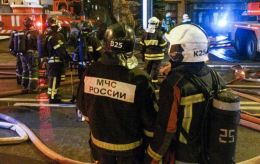Ukraine uses AI-enabled drones to attack Russia's energy sector
 Ukraine uses AI-enabled drones to attack Russia's energy sector (Getty Images)
Ukraine uses AI-enabled drones to attack Russia's energy sector (Getty Images)
Ukraine's strikes on Russian oil refineries have become possible through the use of drones with extended range and some equipped with artificial intelligence (AI), according to CNN.
The broadcasting network highlights that Ukraine continues to target Russia's vast oil and gas industry, which, despite import bans and price restrictions, remains the main source of revenue for the Russian military machine. These attacks are made feasible not only through the deployment of drones with greater flight range but also by integrating artificial intelligence into some of these drones. AI, in turn, assists the drones in navigation and evasion of jamming.
"Accuracy under jamming is enabled through the use of artificial intelligence. Each aircraft has a terminal computer with satellite and terrain data. The flights are determined in advance with our allies, and the aircraft follow the flight plan to enable us to strike targets with meters of precision," the source familiar with the Ukrainian drone program told CNN.
Royal United Services Institute analyst Noah Silvia described the "machine vision," which is a type of AI. Equipped with this technology, a drone can be "trained" to identify geography and targets it is heading towards. Simultaneously, the UAV becomes fully autonomous and does not require communication with satellites.
Warfare expert Chris Lincoln-Jones noted that the current level of "intelligence" is still very low, as the technology is in its early stages of realizing its potential.
The Main Intelligence Directorate of the Ministry of Defense of Ukraine and the Security Service of Ukraine declined to comment to CNN on the use of AI in drones.
Strikes on Russia's military machine
Ukraine's use of drones is not new, as the country began relying on them since the onset of Russia's full-scale invasion. Kyiv has also invested resources in developing domestic drone technology.
At the outset of the war, Ukrainian soldiers mostly used ready-made equipment for surveillance or dropping small bombs. However, later, a full-fledged UAV industry was developed, providing an advantage in countering the terrorists' greater manpower.
According to CNN experts, rather than targeting fuel depots, Ukraine has focused on transfer facilities where crude oil is processed and turned into fuel or other derivative products. Some targets require advanced Western technologies, which are difficult for Russia to obtain.
Experts believe that these attacks could have a greater impact on the Russian economy than Western sanctions, as a significant portion of the latter largely bypasses the terrorist country's energy sector.
Meanwhile, Ukraine claims that 12% of Russian oil refining capacities are currently not operational. Reuters, on the other hand, said that their number reaches 14%.
American concerns
Ukraine's strikes on Russian refineries have caused an increase in global oil prices. Just this year, Brent crude oil has risen by almost 13%. This has raised concerns from the United States.
An official told CNN that the United States neither encourages nor permits strikes within Russia.
Helim Croft, Global Head of Commodity Strategy at investment bank RBC Capital Markets, noted that the agreement between Ukraine and the United States envisioned providing finances and weapons in exchange for avoiding strikes on Russian energy assets to prevent a massive energy crisis.
"If they’re not getting the weapons and money that they were promised, what is their incentive to abide by that deal with Washington?" Croft added.
Russian refineries under attacks
Starting from January of this year, Ukraine has intensified strikes on Russian oil infrastructure. Several strikes have been made on major refineries.
Western media reported that the US supposedly urged Kyiv to cease strikes as it could lead to an increase in oil and gasoline prices globally. However, as Ukrainian officials noted, enemy refineries are legitimate targets for Ukrainian soldiers.
Throughout this year, there have been 15 attacks on Russian refineries. Eight refineries, with a combined installed capacity of 83 million tons per year, have suffered significant damage.

